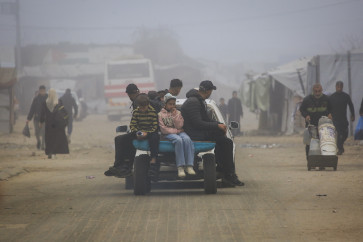Popular Reads
Top Results
Can't find what you're looking for?
View all search resultsPopular Reads
Top Results
Can't find what you're looking for?
View all search resultsForestry industry looks to overturn 2019 exports fall
Brighter outlook: Teak forests are seen in Panggungrejo district, Blitar, East Java, in late September 2019
Change text size
Gift Premium Articles
to Anyone
B
righter outlook: Teak forests are seen in Panggungrejo district, Blitar, East Java, in late September 2019. Forestry industry players are upbeat entering 2020 thanks to policy reforms after suffering an export drop in 2019. (JP/Asip Hasani)
Exports of Indonesian wood products totaled US$11.6 billion in 2019, a 4 percent drop from the previous year due to declining demand caused by the ongoing United States-China trade war and the weak competitiveness of local products. Industry players, however, are upbeat entering 2020 thanks to policy reforms.
Wood veneer, panel and woodwork products suffered the steepest declines, with annual exports falling 20 percent, 16.14 percent and 11.14 percent, respectively, said Association of Indonesian Forest Concessionaires (APHI) chairman Indroyono Soesilo.
Wood panel exports to China are close to zero as Indonesian products have become less competitive than foreign counterparts, while shipments of woodwork products to the US and China were dealt a blow from the ongoing trade war between the world’s two largest economies, an industry player said.
“APHI has become a member of the Food and Agriculture Organization’s [FAO] advisory committee on sustainable forest-based industries. Member countries told us that we’re promoting our forestry products poorly,” he told a press briefing in Jakarta on Jan. 3. Poor marketing efforts meant investors were unaware of the industry’s potential, Indroyono added.
Indroyono, however, is upbeat the forestry industry can bounce back thanks to the government’s policy reform plans. President Joko “Jokowi” Widodo’s administration is preparing omnibus bills that are expected to improve the ease of doing business and investing.
The President, himself a former furniture businessman, is also looking to boost the timber and furniture industries, which are major contributors to Indonesia’s wood product exports. The government is mulling plans to provide value-added tax exemptions for log exports and partially relax the timber legality assurance system to ensure the industry’s products are accepted in select countries.
Indonesian Wood Panel Association (Apkindo) secretary-general Irwan Aten said wood panel production had been on the decline for years. He said outdated machinery, difficulties securing funds and the disruption of new products to the market had contributed to the decline in production.
“We used to export large quantities to China, but now it’s almost zero. Our products have been outmatched by foreign competitors,” said Irwan. Apkindo once had 140 wood panel factories as members but now the number hovers around 30. “Most are not working at full capacity,” he added.
Meanwhile, Indonesian Sawmill and Woodworking Association (ISWA) chairwoman Soewarni said the US-China trade war had seen prices slump.
“The two economic giants are currently at odds and are not buying our products anymore, especially because our main export destination is China,” she said.
Soewarni added that the online single submission system for licensing had not been fully implemented to reduce the complexity of the process. Meanwhile, banks continue to maintain high interest rates for the industry, she said.
“There is still a perception that timber industries are on the negative list, which is untrue. Banks have been cautious and impose a 12 percent interest rate for loans,” added Soewarni.
The Environment and Forestry Ministry, for its part, is preparing production forest management policies that include simplifying licensing for investment and increasing competitiveness through upgrading machinery and product diversification, said acting production forest management director general Bambang Henroyono.
“Based on the president’s vision, we will boost the forestry sector through production forests,” Bambang said, adding that the ministry would open forest management access to local residents through a people’s forest program.
The ministry has issued Regulation No. 62/2019 regarding industrial forest development, which aims to promote the use of industrial forests for the production of diversified products in the bioenergy, pharmaceutical, chemical, food and forestry industries. (mpr)










